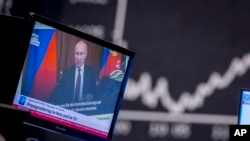On a near daily basis, Scott Cullinane talks with members of Congress about Russia's war in Ukraine. As a lobbyist for the nonprofit Razom, part of his job is to convince them of Ukraine's need for greater U.S. support to survive.
But as lawmakers debated a $95 billion package that includes about $60 billion in aid for Ukraine, Cullinane noticed an increase in narratives alleging Ukrainian corruption. What stood out is that these were the same talking points promoted by Russian disinformation.
So, when The Washington Post published an investigation into an extensive and coordinated Russian campaign to influence U.S. public opinion to deny Ukraine the aid, Cullinane says he was not surprised.
"This problem has been festering and growing for years," he told VOA. "I believe that Russia's best chance for victory is not on the battlefield, but through information operations targeted on Western capitals, including Washington."
The Post investigation is based on more than 100 documents collected by a European intelligence service.
The files exposed a Kremlin-linked campaign in which "political strategists and trolls have written thousands of fabricated news articles, social media posts and comments that promote American isolationism, stir fear over the United States' border security and attempt to amplify U.S. economic and racial tensions," the Post reported.
Social media
One of the main methods for spreading such disinformation is social media, according to Roman Osadchuk, a researcher at the Atlantic Council's Digital Forensic Research Lab and an expert on propaganda and influence campaigns.
"The process begins with a Russian publication on a small website or social media account. This is then picked up by a small Russian Telegram channel, which is subsequently shared by a larger channel with more subscribers," Osadchuk said.
From there, someone will translate the content into English and share it, for example, on X.
"This is how Russian disinformation can quickly spread within the English-speaking X community," Osadchuk said.
In an article published April 8, The Washington Post cited Microsoft and the social media intelligence company Graphika as saying that some articles created within this operation could have been first published on sites known as doppelgangers.
Osadchuk told VOA that these are deceptive replicas of legitimate media websites. They feature fake articles and are often taken down, only to be replaced by clones with slightly different web addresses.
"Nobody would know about these sites' existence unless they are promoted on social media platforms. However, as soon as they detect them, social media block them. So, Russians quickly replace banned sites with their clones," he said.
Worldwide effect
In interviews with U.S. media, two influential Republicans said they believe the propaganda has influenced their base and some of their colleagues.
"It is absolutely true. We see, directly coming from Russia, attempts to mask communications that are anti-Ukraine and pro-Russia messages, some of which we even hear being uttered on the House floor," House Intelligence Committee Chair Mike Turner said in an interview with CNN.
In an interview with the U.S. news website Puck, Michael McCaul, head of the House Foreign Affairs Committee, said, "Russian propaganda has made its way into the U.S., unfortunately, and it's infected a good chunk of my party's base."
Serhiy Kudelia, a political scientist at Baylor University, says the Kremlin messaging is effective because it plays on existing fears.
He says the disinformation seeks to reinforce already held beliefs such as the wastefulness of aid to Ukraine, or fuels existing anger and energizes opposition to sending assistance.
"When such alignment occurs, it is easier to push through disinformation and invented news stories that would be accepted as credible by a large number of people, including members of Congress, since they reinforce their prior beliefs," Kudelia said.
"Once fabricated stories enter mainstream public debates, they become almost impossible to debunk or separate truth from lies," he said.
The disinformation campaign is similar to ones seen in Europe. Both seek to decrease support for Ukraine, undermine public trust in their institutions and polarize society, says Jakub Kalenský, a senior analyst at Helsinki-based European Centre of Excellence for Countering Hybrid Threats.
Kalenský, who is deputy director of the center's Hybrid Influence team, believes the Kremlin's disinformation activities have a significant effect on politics worldwide.
"This is why Russia employs thousands of people for this activity. This is why they spend billions every year, because they see it works," he said.
But Olga Belogolova, director of the Emerging Technologies Initiative at Johns Hopkins University, says that it is hard to know how effective these propaganda efforts are.
"Russian influence operations are not necessarily always designed to get people to believe anything in particular, but to get them to believe nothing at all," she told VOA. Belogolova added that claims of the efforts being successful in swaying opinion "is not only irresponsible, it's dangerous."
Countermeasures needed
Last month, the U.S. Treasury Department issued sanctions on two people and two companies that it says are connected to a "foreign malign influence campaign." They include Moscow-based Social Design Agency, its founder Ilya Gambashidze, Russia-based Group Structura LLC and its CEO Nikolai Tupikin.
The Social Design Agency and Gambashidze are believed to be involved in the campaign described in the Post article on April 8.
Kalenský advises governments on countering disinformation and says its success requires countermeasures.
These include strengthening detection and documentation of Russian disinformation campaigns, increasing awareness and resilience of audiences to the propaganda efforts, and preventing the aggressor from exploiting weaknesses of social media and societies.
"Finally, we need to impose higher costs on the information aggressors. So far, they are almost unopposed in conducting their aggression," Kalenský said.
For Cullinane, the Russian disinformation campaign makes his job harder. He says the debate about the role the U.S. should play in the world appears to be shifting and invoking pre-World War II isolationism.
But he remains resolute. Part of his work is finding what resonates most with each lawmaker.
"Some offices focus very much on the human rights situation in Ukraine. Many members are very moved by the plight of religious communities in occupied territories of Ukraine and the persecution they face at the hands of the Russian military," Cullinane said. "Other offices are very intrigued by the military reform and the military innovation brought about by an active war in Ukraine."
The national security spending bill is currently awaiting approval in the House.
This story originated in VOA's Ukraine Service.


